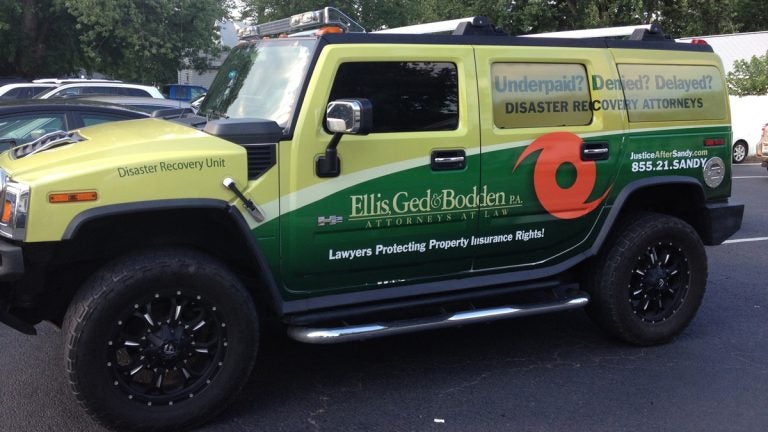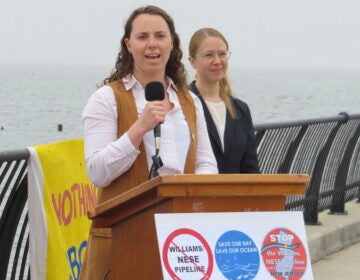Insurance claim delays are prompting some Sandy victims to sue
Listen
This law firm advertises its expertise in disaster claims. (Scott Gurian/NJ Spotlight)
After Jakeabob’s Bay restaurant in Union Beach was completely destroyed during Sandy, owner Angelita Liaguno-Dorr — known to everyone locally as “Gigi” — considered it a small victory when she re-opened five months later, at a temporary location in a different part of town. But as time went on, she realized that things at the new place just weren’t the same.
“I still have people call, and they’ll ask, ‘Who’s playing on the tiki bar this evening? Is there a wait on the deck?’ They have no idea that the business was lost,” she says. Gigi tells them Jakeabob’s is now at a temporary location, and they inevitably ask if it’s still on the water, with the skyline of lower Manhattan in the distance, like at the old site. She tells them it isn’t, and then the people don’t come. “Those calls are difficult to answer,” she says. “It hurts.”
There’s another reason why business has been slow all summer. Gigi says many of her customers who lived in town left after the storm and still haven’t returned. And she thinks those who have are struggling to get back on their feet and can’t even begin to think about going out for dinner. All these factors combined have made things especially hard these last few months.
“We have to figure out the mortgage up on the [original] restaurant, we have taxes, we have sewer. I have my house bills. I have my mortgage there. Then we have our rent here,” she lists. “So I’ve had to do a lot of creative financing. I don’t know how much more creativity I have to pull out of my hat.”
If you’re a Sandy survivor, we want to know about your experiences — good or bad — with your insurance company. Please take a few minutes to fill out our survey.
With the first anniversary of Sandy quickly approaching, Gigi is one of many business owners and residents along the Jersey Shore who are still fighting with their insurance companies, unsure if they’ll ultimately get enough money to rebuild. People unhappy with their flood insurance settlements have just a few weeks left to file a proof of loss form to start the appeals process, and many homeowners’ policies in New Jersey place a one-year statute of limitations on filing lawsuits. After months of waiting, and with the clock ticking down, Gigi and many others have turned to the courts, seeking legal remedies for their problems.
The lease at Gigi’s temporary location — which she calls “Jakeabob’s Off the Bay” — runs through March, but she’s still trying to figure out what comes next. She estimates it would cost about $2 million dollars to rebuild at the old site, and if all went according to plan, most of that would be covered by a mix of aid money and insurance.
So far, she’s gotten nearly $500,000 — the maximum payment from her flood insurance — and the Small Business Administration approved her for a $170,000 low-interest loan. But her property insurer — Lloyd’s of London — has paid out less than $10,000 on an $850,000 policy.
“I was upset at first, and I thought, OK. So, ‘Breathe, Gig, just breathe,'” Gigi recalls. “I said, ‘We’re going to agree that that’s the damage that the wind did?’ ‘Yes.’ I said, ‘Then come fix it. If you can fix it for $9,657.14, come fix it!'”
Lloyd’s says they can’t comment on specific cases, but they’ve told Gigi that since the storm surge caused the damage, her flood insurance is responsible. She contends that it was the wind that slammed water into the restaurant, collapsing the walls and caving in the roof, so her property insurance should kick in. To make matters worse, Gigi also has a $300,000 business interruption policy, but it’s linked to her property insurance, so until this dispute is resolved, she can’t access any of that money either.
Left with few other options, Gigi’s enlisted the help of Ellis, Ged and Bodden, one of several law firms traveling up and down the coast, signing up clients in the aftermath of Sandy. On a weekday evening a few months ago, she invited members of the firm to hold a public event at the restaurant to provide Union Beach residents with information about their legal options going forward. Dozens of people crowded into the main dining room as attorney Glen Ged presented a PowerPoint slide show detailing how the insurance appeals process works.
“We want to put you on an equal playing field with the insurance industry,” he explained. “When our firm is hired, we actually invest right away in your case, and we start writing checks: write checks to the estimator, write checks to the engineer, write checks to the meteorologist to make sure that we can document your damages. The insurance companies have their experts, and you need your expert to fight with their expert and see where the truth lies.”
The firm handles all sorts of Sandy-related insurance disputes, but the flood claims are without a doubt the most complicated. Attorneys interviewed for this story described the process of appealing a flood insurance settlement as a nearly impossible task for someone without a legal background. Even among professionals, it requires a special expertise that most attorneys in New Jersey simply don’t have. That’s why the vast majority of such cases in the state are now being handled by just two firms: Ellis, Ged and Bodden has experience dealing with the aftermath of hurricanes in Florida, while the other firm — DeFrancesco Bateman — has enlisted the support of a Houston attorney who dealt with flood insurance appeals after Hurricane Ike.Ellis, Ged and Bodden charges between a quarter and a third of any money it recovers. And it’s picked up hundreds of clients, with the one-year deadline to file appeals or lawsuits quickly approaching.
Exact numbers on how many New Jersey residents are still appealing their insurance settlements are hard to come by. The state Department of Banking and Insurance doesn’t keep track of the number of lawsuits filed, but a spokesman says they’ve received over 1,700 complaints. They’ve also gotten nearly 600 requests for mediation on non-flood claims, and have been able to negotiate resolutions in about 70 percent of those cases. So far, the Department has taken enforcement action against seven, mostly out-of-state public adjusters — including license revocations and fines up to $20,000 — for improper handling of claims. Several more investigations are ongoing, though a spokesman declined to provide numbers or offer details about the types of violations, other than to say that the department is making sure that everyone followed the law and that consumers have been treated fairly.
Overall, the Department says 96 percent of all non-flood claims (including homeowners, commercial property, auto and business interruption insurance) have now been closed, and FEMA says 99 percent of all Sandy-related National Flood Insurance Program claims are closed. Those figures don’t tell the whole story, though. Insurance companies often consider a case “closed” after they’ve issued their payout, but in many instances, policyholders can and do continue to file appeals.
When it comes to flood claims, part of the reason some policyholders might be dissatisfied with their settlements is a result of the way the National Flood Insurance Program is set up. Although it’s a federal program, day-to-day operation of the NFIP is run by private insurance companies, who issue the policies and make the payout determinations, based upon strict government rules of what is and isn’t covered.
After hurricanes Rita and Katrina, audits found that some insurance companies had paid out more than they were supposed to, so they were forced to pay the government back. Attorneys familiar with the matter say that’s made the industry gun-shy and overly conservative in its payout determinations. And while the insurance companies are afraid of overpaying flood claims, they say there are no ramifications if a government audit finds they underpaid. In addition, even if a policyholder were to sue and win, the worst that could happen is that the insurance company could be forced to pay out more on the claim, since there are no provisions for policyholders to collect punitive damages or attorney’s fees on federal flood insurance cases.
While the prohibition on claimants collecting punitive damages or attorney’s fees serves as a check on what could otherwise be costly litigation, it also means that in most cases, a policyholder who files and wins a lawsuit against his or her flood insurance company has only the increased settlement amount out of which to pay an attorney. As a result, many law firms that specialize in this area are reluctant to litigate such cases unless they expect a large payout — one attorney interviewed suggested a threshold of $50,000 — so they can break even. With smaller amounts, it may be hard to find an attorney to represent a plaintiff, and the case could slip through the cracks.
As far as the problems coastal residents are experiencing with their homeowners insurance policies, lawyers working on behalf of claimants note that the scale of the destruction caused by Sandy was unprecedented in recent memory in New Jersey. They claim that it overwhelmed the resources of many insurance companies, particularly smaller and regional ones that had never before dealt with a disaster of this magnitude. They say claims adjusters were overtaxed, and their damage assessments were hastily written, sometimes missing key observations that could lead to larger payouts. And with adjusters in short supply, there’s speculation that some who lacked proper knowledge and experience may have been drafted to assist in the storm’s aftermath.
As might imagine be imagined, the insurance industry sees things differently. Chris Hackett with PCI, an industry lobbying group, says he doesn’t think the number of lawsuits is widespread, and that companies generally did the best they could, under challenging circumstances.
“The insurance industry overall has done an outstanding job overall, responding to Hurricane Sandy victims,” he says. “We adjusted thousands of claims in a short amount of time, not only in New Jersey, but in New York. As with any natural catastrophe where there’s thousands of claims, there are going to be a few claims that will take longer to settle. And that’s not unexpected.”
But that’s little consolation for Gigi and other residents and business owners still anxiously waiting for a resolution, so they can move on with their lives.
“All everybody wants to do is go back home,” she says. “You have insurance, you pay your premiums, you do what you’re supposed to do in the event that something happens… This is the event. And not to be paid for it and not being able to move forward . . . That’s hard to swallow. That’s a hard pill.”
It’s made even harder by the fact that she paid $44,000 a year for all her insurance policies before the storm.
As the Vice-chair of the Assembly Environment and Solid Waste Committee State, State Assemblyman Reed Gusciora (D-Trenton) has heard many insurance horror stories like this when he’s participated in Sandy recovery hearings around the state.
As a result, he’s introduced A-4382, a bill to mandate that insurance companies bargain in “good faith” when handling claims arising out of declared disasters. In essence, the bill would lower the burden of proof for attorneys representing policyholders, potentially making it easier to win appeals and setting up a complaint mechanism for the state Department of Banking and Insurance to keep track of “who the bad actors are.”
“By sheer virtue of that being on the books, insurance companies are not going to want to drag things out,” Gusciora says. “It would certainly shorten the time that a claim is presented and resolved, or that’s at least the aim of the legislation.”
The measure has its critics. Chief among them is the insurance industry, itself, which predicts that such a law would fuel excess litigation — including higher out-of-court settlements and more frivolous lawsuits. And that, insurance companies claim, would ultimately raise premiums for all New Jersey residents.
Previous attempts to pass similar legislation in the state never gained much traction, amid heavy lobbying from insurance companies. Gusciora thinks his bill — which limits its focus to claims arising out of disasters — might have a better chance of passage. Meanwhile, back in Union Beach, whether or not things eventually turn out in Gigi’s favor will depend largely on the specific wording of her policy. Her belief that the storm surge that destroyed her business was “wind-driven water” and should thus be covered by her property insurance is a matter of dispute, subject to differing legal interpretations.
Martin Mayo – the Houston attorney who handled insurance appeals after Hurricane Ike and is now serving as counsel for DeFrancesco Bateman – thinks the answer is pretty clear. “People have made the claim for years that because wind is involved, flood damage should be covered by wind insurance,” he says, “but federal courts have opined that ‘a flood is a flood is a flood,’ and there’s a very clear distinction within the industry about what constitutes a flood event. If you’re working on the premise that ‘wind-driven rain’ constitutes a flood event, it’s my experience that that won’t fly. Insurance companies will be very defensive on that.”
Marius Ged, managing partner at Ellis, Ged and Bodden – the firm Gigi has hired – contends that things aren’t so black and white. When it comes to the question of which insurer is responsible when there are concurrent issues like wind and water, “New Jersey isn’t 100 percent committed either way,” he says. “If the flood came first, and you’re the wind carrier coming in second, the whole claim’s denied.” But in this case, he adds, “really, the wind started twelve hours before. The storm started the day before.” That’s why the firm employs its own team of meteorologists, to produce contrary evidence to present before a judge. “It’s a very dicey issue, actually, and it’s going to be litigated,” he says. “It’s not settled in New Jersey law.”
Given that uncertainty, Gigi’s attorneys have gone ahead and started the process of filing a lawsuit. But even if she reaches a favorable settlement, they’ve told her it could take at least another year before the case is resolved. The problem is, without the business a restaurant with an ocean view brings, Gigi doesn’t know if she’ll be able to hold out that much longer.
If you’re a Sandy survivor, we want to know about your experiences — good or bad — with your insurance company. Please take a few minutes to take our survey.
___________________________________________________
Scott Gurian is the Sandy Recovery Writer for NJ Spotlight, an independent online news service on issues critical to New Jersey.
WHYY is your source for fact-based, in-depth journalism and information. As a nonprofit organization, we rely on financial support from readers like you. Please give today.




